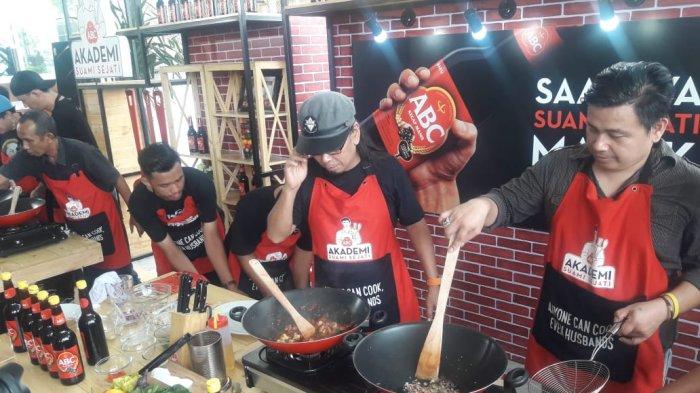Popular Reads
Top Results
Can't find what you're looking for?
View all search resultsPopular Reads
Top Results
Can't find what you're looking for?
View all search resultsBoys in the kitchen: Students try their hand at cooking
“Women can also go out [to pursue a career], so why can't men work in the kitchen?”
Change text size
Gift Premium Articles
to Anyone
E
ven though Eko Budi Pratama, a 16-year-old studying at SMK 2 state vocational school in Tangerang, Banten, helps his mother with household chores once in a while, cooking was foreign to him.
When he participated in a cooking class at his school on Tuesday, his gestures and expression made it obvious that he was not familiar with kitchen chores.
In charge of preparing ingredients with nine peers, all-male, he sliced onions timidly as it was the first time he had used a kitchen knife.
“I was so nervous,” he told The Jakarta Post after the class. “Especially about the onion. I kept it at a distance while I was cutting it so that my eyes would not water.”
That afternoon, Eko participated in a cooking class held by Kraft Heinz ABC called Kecap ABC Koki Muda Sejati (ABC Soy Sauce Young Real Chefs), as well as plating sesame tempeh.
The event was part of a campaign by the firm to instill gender equality at a young age to help close the gender gap.
“The message is better instilled if conveyed a young age. Senior high school age is the golden age when they attempt to find their true selves and can learn many skills,” Heinz ABC brand manager Belinda Olga Cinintya said after the event.
This year, the firm will visit 10 schools and plans to increase it to 50 schools next year.
“We discussed [with the school] whether it shared the same values as us. And their response was positive. We agreed that it was a good idea for the long term,” she added.
Eko said he had he never cooked a meal at home, but he often observed his mother preparing food, which had given him knowledge on how to prepare ingredients.
The oldest of three usually helps his mother arrange food on the dining table instead of cooking. Likewise, he helps with packaging when someone buys snacks from his mother, a housewife who accepts food orders.
Different from Eko, Khoirul Akmal Rizki, 17, had his first cooking experience seven years ago when his parents were not at home.
"I was afraid to even turn on the stove," he told the Post.
No smartphone could be used to kill time or television program attract his interest at that time. Out of curiosity, he decided to cook fried rice based on his observation of what his mother did. It tasted "not bad" for a first-timer, he said.
“My mother then taught me to cook because she said that if I had to rely on other people, I would not eat,” he added.
Despite having different cooking skills, Eko and Akmal have something in common: their mothers taught them that males should help with domestic chores.
However, after observing his mother, Eko feels that males are not as capable in the kitchen as females.
“Because of what I've seen with [my mother] working neatly. She also cooks with heart,” he said.
But other domestic tasks are a suitable for anyone, he added.
Eko said he washes his school uniform, except the white one, after school.
“Once I get back from school, I immediately wash it. I should not let my washing pile up. My mother taught me that,” he said.
As someone hoping to attend university in Bandung, West Java, Eko does not mind washing his own clothes because it is something he will have to do when he lives by himself outside of town.
Akmal's mother also taught him that it was fine for men to cook.
“Women can also go out [to pursue a career], so why can't men work in the kitchen?” he asked.
One of Akmal's classmates, Muchamad Singgih Nugroho, 17, who also attended the cooking class on Wednesday, said men should not be ashamed of working in the kitchen.
Moreover, male chefs are common on televisions.
“They even look more masculine [when cooking],” he said, arguing against the belief that cooking was a female area of expertise.
Nurbayu, the school principal’s deputy for industrial relations, said the cooking classes were a good way to learn, especially for teenagers who had no experience in the kitchen.
Awareness of gender equality is increasing, she said. However, there is more emphasis on females pursuing a career in this field.
“Sometimes we forget that in daily life, it is also important to fulfill each other’s needs. There is nothing wrong with a male helping with domestic tasks,” she said.










